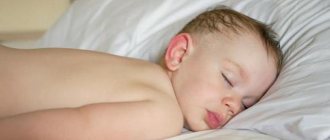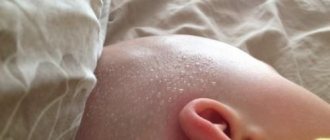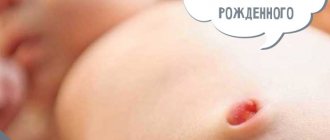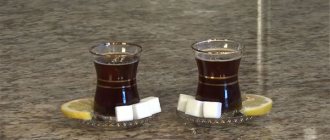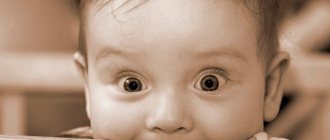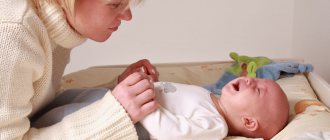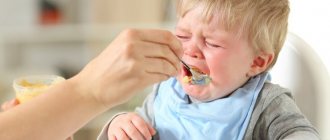Excessive sweating in children sometimes becomes a definite signal that the child has some kind of disease, one of the symptoms of which is hyperhidrosis (local or general increased sweating). If a child is sweating after playing active games or is dressed too warmly, then there is no reason to worry. In this case, profuse sweating is the result of the body's reaction to heat. If a child sweats in a cool room, then it is necessary to exclude various diseases that cause excessive sweating.
Common Causes of Excessive Sweating in Children
The most common causes of sweating in boys and girls are:
- overweight – it is harder for obese children to move than thin children;
- Rickets is a disease that occurs in children due to a lack of vitamin. The disease manifests itself during a period of intensive growth. The disease most affects the bone skeleton. To prevent this disease, long walks in the fresh air, hardening and massage are recommended;
- emotional experiences - if adults experience sweating under the arms or on the palms when excited, then in children this more often manifests itself on the head and neck. If the cause of increased sweating is the child’s fears and worries, then parents should talk to their son/daughter and find out what is bothering him/her;
- genetic predisposition - if one of the relatives in the family sweats, then this problem may also manifest itself in the child. But it’s one thing when sweating occurs in women or men, and another thing when hyperhidrosis manifests itself in a child. Teimur's paste can also help an adult, but children need an integrated approach in treating excessive sweating, because the problem comes down to internal problems in the body.
What to do if your child sweats a lot?
The basic rule is this: if a child is one year old and he is sweating, then he needs to be given a lot of water. It is necessary to try to exclude all possible causes of overheating. But this does not mean that the baby needs to run less. You just need to put it on easier, ventilate the room, and moisten it. The optimal temperature of the room where the baby sleeps and plays should be between 18-20 degrees.
To prevent increased sweating from interfering with the child’s life, parents should begin to harden the child from childhood: pour cold water on him, use a contrast shower.
Sweating causes dehydration, loss of salts, as well as elements such as potassium and sodium. These compounds are needed for normal functioning of the heart, as well as the nervous and immune systems.
Hyperhidrosis in children: symptoms
Pathologically increased sweating in children is called hyperhidrosis. It is not difficult for parents to detect the disease. Mom or dad may notice wet spots on the children's bedding or tactilely feel that their son/daughter has wet hands, wet hair, a red face, wet feet that emit a characteristic odor. To these obvious signs is added a deterioration in mood: due to increased sweating, the baby feels unwell, becomes irritable, overly excitable, and tearful; he has problems with sleep and appetite. Soon other symptoms are added: heat rash, red spots in areas of increased sweating.
What to do if a young child is sweating?
In order to alleviate the baby’s condition, establish a heat transfer system and stop worrying about their son/daughter, parents should adhere to the following recommendations:
- If the child is sweating, then there is no need to wrap him up and swaddle him.
- You need to monitor the air temperature in the bedroom where the baby sleeps.
- Choose children's clothing, as well as bedding for your baby, from natural fabric.
- It is important to provide the child with normal access to air - ventilate more often, abandon the canopy on the bed and the “bumper” - protection for the crib.
- You need to give your baby water to drink, even if he is only breastfed. The baby needs to be given water from the second month of life.
- It is necessary to monitor the calm atmosphere in the house: constant screams of parents, noise, knocking - all this disrupts the functioning of the baby’s nervous system, he may worry about this, as a result, his body will begin to sweat.
Excessive sweating in an overweight child
If a child suffers from excess weight, then such a symptom as hyperhidrosis is often observed. To help the child cope with the problem, parents must eliminate the cause of this condition, namely, fight excess weight. How can I do that? The following set of measures will come to the rescue:
- register your child for a sports section (football, Thai boxing, swimming, etc.);
- exclude various sweets, baked goods, and fast food products from the child’s diet. Focus on eating fresh vegetables and fruits;
- regularly take walks with your son/daughter;
- limit your child’s games on the computer, tablet, or phone. The child should play actively: run with a ball, play on the playground with other children, and not sit at home using gadgets;
- parents should pay attention to the child: ask how he spent his day, ask how he is doing in kindergarten, school, walk with him.
The child sweats during the day
The causes of sweating in children during the day are not much different from those that occur at night. These are still the same clothes made from low-quality fabrics and not in accordance with the season of the year. In addition, you should consider whether your fidget is energetic. After all, it is more likely that a child will sweat during active games than just sitting in a stroller. And if we add to this the “wrapped up” nature of the baby, then the picture is clear. The problem for many parents is that their children are not dressed correctly. You can often notice that a month-old baby is dressed too warmly, regardless of the weather. The same problem applies to a one-year-old baby and older children.
For example, one-year-old children are in an active stage of development. He can be called a little explorer, who is extremely interested in everything around him. Therefore, it is quite natural that he is physically active. This means that such a child should be dressed lighter than one who prefers to explore the world while sitting in a stroller. To prevent your baby from sweating, wear a light, loose T-shirt closer to your body. You can throw a loose jacket on top. Assess the situation soberly and focus on the weather and the child’s energy level. In addition, you can always take a backpack with you, along with a light sweater or jacket.
Another reason for sweating in a child, whether it is an infant or an older child, is excess weight. Many parents prefer not to notice this problem. And our grandmothers believe that this is how it should be. Others see a problem but don't think about the consequences. Meanwhile, overweight children need proper nutrition, regular exercise and activity during the day.
Why does a child's head sweat?
In addition to provoking factors that can cause increased sweating of the head (stuffy room, wrapping a child), the causes of increased sweating of the head can be:
- Colds, ARVI, sore throat - sweating of the head is associated with an increase in the child’s body temperature. In addition to hyperhidrosis, the child experiences weakness, passivity, cough, runny nose and other cold symptoms.
- Rickets – there is increased sweating not only of the head, but also hyperhidrosis of the armpits, feet, and palms. Signs of rickets are also deformations in the temporal and frontal bones of the skull, in the chest.
- Allergic reaction to feathers in the pillow, to bathing products. Children with allergies often experience increased sweating on the head.
- Heart failure. Children with this pathology experience cold sweat, shortness of breath, intermittent and rapid breathing, and bluish lips. The disease develops against the background of influenza, anemia or pneumonia.
Other non-dangerous reasons
In addition to those described above, there are other factors that cause intense sweat production. Many causes are easily correctable and are not considered a pathology. In what cases is sweat not a dangerous manifestation:
- Medications lead to sweating. If you do not adhere to the required dosage, your head and hands may sweat even when taking vitamins.
- Improper skin care: infrequent bathing, excessive use of cosmetic products (creams, oils).
- Excess weight: mainly appears in newborns who are breastfed. Here, perspiration appears not only when he eats, but also when he plays or cries.
Treatment of hyperhidrosis in children
It is necessary to treat childhood hyperhidrosis competently, making sure to find out the cause of excessive sweating. The principle of treatment for such a problem largely depends on the diagnosis, the symptom of which is hyperhidrosis:
| Causes of excessive sweating in children | Principle of therapy | Treatment |
| Excess body weight | Reduce body weight to normal levels | Diet, increased physical activity |
| Infectious or viral diseases | Treat ARVI, flu and colds in a timely manner to avoid complications | Taking antiviral drugs, vitamins, immunostimulants |
| Rickets | Eliminate vitamin deficiency, normalize phosphorus-calcium metabolism | Taking vitamins, as well as calcium and magnesium supplements, sunbathing |
| Allergy | Eliminate contact with allergens, increase the body's defenses | Taking antihistamines, replenishing calcium deficiency, removing allergens using enterosorbents, drinking more to remove toxins |
| Malfunctions of the nervous system | Eliminate depressive disorders, panic attacks, | Taking sedatives, massage, aromatherapy, healthy lifestyle, taking vitamins and minerals, sedatives |
The child sweats at night
Most often, parents are concerned about the issue of heavy sweating in their child at night. If you are sure that the cause of sweating is not a cold or any other disease, then the problem lies in external factors. Most likely, the child has uncomfortable sleeping conditions, which provoke sweating. Such conditions can be called:
- Very warm pajamas
- Clothes made from synthetic fabrics
- High room temperature. It is more difficult to fall asleep in a hot room.
And other similar reasons. It seems there is nothing difficult to keep track of such simple things. However, many parents ignore these points. By the way, synthetic fabrics interfere with normal air circulation. This in turn causes sweat to collect on the baby's skin when it would normally evaporate. The optimal temperature for sleeping for an infant and a teenager is considered to be 18–20°C, with a humidity of approximately 50–60%. Failure to comply with these standards is the main reason why healthy children may sweat.
Eating a hearty dinner right before bed is another likely cause of sweating in children. Doctors do not recommend eating before bed for either a one-year-old child or an adult. Eating a hearty dinner means your body will be energetic at night. And here the sweat glands will come to his aid. Try to feed your baby a few hours before bedtime. If you think that your child is still hungry, you can give him a glass of kefir. But no rich and heavy dishes.
In addition, overexcitability can trigger nocturnal hyperhidrosis. Remember, our grandmothers also said that there is no need to play active games with your baby before bedtime. This is true. And as a result, you and your baby may have a restless night. The best option is if you bathe your son or daughter in a warm bath with string or chamomile and read to him before bed.
Consequences
If a child sweats while sleeping, while awake, or even unexpectedly, for no apparent reason, then this should alert any mother. She should ask the doctor why the child is sweating, what could be causing this condition? If parents let this situation take its course, the consequences can be disappointing: dehydration, disruptions in the functioning of the whole body as a result of the loss of a large amount of minerals, fungal skin lesions, psoriasis, as well as psychological problems: isolation, fear of communicating with peers, etc. d.
Doromarin vitamins for children can cope with night sweats, hyperhidrosis of the feet, palms, head or whole body. This therapeutic and prophylactic product is used for the complex treatment and prevention of hyperhidrosis. The complex acts in several directions, helps eliminate the cause of hyperhidrosis, and not only removes the symptoms itself - excessive sweating:
- increases the body's defenses, prevents the occurrence of infectious and viral diseases, due to which a child may develop hyperhidrosis;
- improves metabolism, prevents fat deposition, promotes its rapid breakdown, transforms fat into energy. The complex fights the cause of excess weight, prevents the formation of excessive sweating as a consequence of obesity;
- improves the functioning of the nervous system;
- promotes the elimination of toxins, thereby preventing the risk of allergies;
- has a positive effect on the functioning of the heart, normalizes blood circulation, thereby preventing the occurrence of heart failure - one of the causes of hyperhidrosis.
WHY DOES A BABY SWEATER DURING FEEDING?
— Ekaterina Borisovna, what does the baby’s sweating during sucking indicate?
- All children sweat. It is necessary to distinguish between normal and excessive sweating. Moderate sweating during feeding is considered normal and is not a cause for concern. But it should not be accompanied by a bluish coloration of the face or nasolabial triangle, or the appearance of cold sticky sweat running down the face or back. The normal act of sucking is usually not accompanied by the baby's anxiety, shortness of breath with retraction of the intercostal space, or pronounced palpitations. Otherwise, you should immediately consult a doctor.
| PHYSIOLOGICAL SWEATING | PATHOLOGICAL SWEATING |
| The baby sweats adequately in hot weather, overheating, physical work - gymnastics, massage. | The room is cool, but the baby wakes up wet from sweat. In a calm state, the child is forced to change clothes several times. |
| REASONS WHY A BABY SWEATS DURING FEEDING | |
|
|
| PHYSIOLOGICAL SWEATING | |
| The baby sweats adequately in hot weather, overheating, physical work - gymnastics, massage. | REASONS WHY A BABY SWEATS DURING FEEDING
|
| PATHOLOGICAL SWEATING | |
| The room is cool, but the baby wakes up wet from sweat. In a calm state, the child is forced to change clothes several times. | |
REASONS WHY A BABY SWEATS DURING FEEDING
|
The child sweats during feeding due to health problems, as well as when he is hot or his clothes do not match the air temperature.
— Does age affect sweating?
— Sweat glands start working at the age of one month. Until five or six years of age, the thermoregulation function develops. During this period, maximum sweating is observed. The second peak of sweating is adolescence, when sex hormones turn on.
— Intense sucking can cause sweating?
— The act of sucking a breast or bottle is work, especially for a baby in the first months of life. Therefore, even slight discomfort can increase sweating during feeding. Also, the baby may spend more energy due to some features of the mother’s breast anatomy. And even a child’s posture is of great importance - if the child is uncomfortable and has to strain all his muscles, he will sweat.
— Almost every mother notes that the newborn’s head sweats when feeding. What parts of the body still sweat?
— During sucking, the baby does a tremendous amount of work, which involves the muscles of the head, neck, and upper shoulder girdle. Therefore, normally these areas sweat during feeding. With imperfect heat exchange, the child's palms and feet may sweat heavily, since a large number of sweat glands are concentrated there.
— Often a sweaty head and the development of childhood rickets are interconnected processes?
— Sweating combined with baldness at the back of the head often worries parents. This is the most famous symptom. But it is worth remembering that the hair on the back of the head is wiped off normally in healthy children, especially until they have learned to sit, and they move their heads very actively.
Features of the Doromarin complex
If your child is sweating, the first thing to do is to find out the cause of hyperhidrosis. But if some difficulties arise with this (it is difficult for a doctor to make a diagnosis, he cannot say exactly what specific cause was the result of hyperhidrosis), then it is advisable to start taking Doromarin. The peculiarity of this product is that it not only relieves the child of the symptoms of hyperhidrosis, but also treats the reason why the child feels unwell. The Doromarin complex works like this:
- improves the functioning of the endocrine, vegetative-vascular, and nervous systems;
- normalizes the process of sweating;
- treats the causes of severe sweating: allergies, nervous disorders, diseases of the central nervous system, endocrine pathologies, etc.;
- increases the body's defenses for an enhanced fight against bacteria and germs, due to which increased sweating may be accompanied by an unpleasant odor;
- normalizes fat, protein and carbohydrate metabolism, thereby preventing the process of fat deposition;
- neutralizes toxic substances entering the children's body;
- improves blood composition, etc.
Doromarin is a natural complex of vitamins for children that create optimal conditions for the normal functioning of the whole body, helping to resist various diseases, including combating excessive sweating.
If you don’t know why your child sweats a lot, according to the test results he should not have any pathologies, then buy him a complex of vitamins for children Doromarin. This therapeutic and prophylactic product will never hurt, but on the contrary, it will help cope with pathological sweating, as well as with other problems that children often suffer from: poor appetite, adenoids, low hemoglobin, decreased immunity, against which various respiratory and viral infections appear. infections.
Sweating and rickets
Perhaps rickets is the very first thought that comes to mind when a parent notices the baby’s severe sweating. And, unfortunately, it does not go away on its own. Rickets is characterized by metabolic disorders, deficiency of calcium, phosphorus and vitamin D. As the disease progresses, it affects the child’s bone and nervous system. Most often, the first signs of rickets appear at the end of the second month of life, the beginning of the third. Indeed, severe sweating in a child is one of the first signs of the disease. In this case, the sweat acquires a sharp, unpleasant odor. Constant sweating causes irritation on the skin. At the same time, the baby experiences sleep disturbances, severe irritability and muscle lethargy. The sequence of overall development also changes. In children suffering from the disease, the fontanel overgrows later, and teething also lags behind their peers. With rickets, nocturnal hydrosis occurs more often than daytime hydrosis. And mostly the child’s head sweats. Because of this, the baby's hair often rolls down on the back of his head. The fact is that the baby becomes restless, his sleep is disturbed and he constantly turns his head.
By the way, the absence of hair on the back of the head does not mean the presence of a disease. Don't ignore preventive measures. Try to walk with your child as often as possible, especially on sunny days. Take vitamin D. Make sure your child gets regular, moderate physical activity.
Composition of Doromarin
Vitamins for immunity Doromarin is a universal therapeutic product against hyperhidrosis, excessive sweating and other problems in young patients. The high effectiveness of the natural complex is achieved thanks to its thoughtful composition, which contains:
- Laminaria Angustata is a real treasure, a gift from the sea, thanks to which you can improve the functioning of all organs and systems. If a child has increased sweating, then angustate kelp, which is part of Doromarin, will help normalize the functioning of the sebaceous and sweat glands, strengthen the heart, and eliminate negative phenomena such as lack of appetite, fatigue, and loss of strength. This plant strengthens bone tissue and teeth in children due to large amounts of vitamin D;
- sea cucumber extract – has a powerful antibacterial effect, promotes rapid recovery of the child’s body after illnesses, including hyperhidrosis, fights helminthiasis, vitamin deficiency, bronchitis, laryngitis, asthma, etc.;
- fruit juice – improves the taste of the Doromarin product;
- sea calcium - saturates the child’s body with calcium, necessary for children during growth, during rehabilitation after an illness, as well as for everyone who lives in environmentally unfavorable areas, in large cities;
The complex also contains vitamins, micro- and macroelements, polysaccharides, which enhance the effect of the main components of the vitamin complex, improve the functioning of the immune system, improve sleep, increase the child’s physical performance, etc.
Doromarin is an indispensable assistant for a growing child's body. See for yourself the quality of this product, read reviews about hyperhidrosis and the successful treatment of this disease:
You can buy Doromarin with free delivery throughout Kazakhstan.
BUY DOROMARINE
The child is sweating
Solution
If a mother notices that her baby is sweating while breastfeeding, it would be a good idea to contact a pediatrician. The doctor will conduct a thorough examination, rule out possible diseases and suggest why this is happening.
To avoid increased secretion during feeding, the following steps should be taken:
- Do not overly wrap your baby;
- Ventilate the baby's room, especially before bedtime and feeding;
- The optimal room temperature should be 18-22 degrees, and air humidity about 70%;
- Dress the baby only in clothes made from natural fabrics;
- When feeding by hand, choose clothes made from natural materials;
- If the room is warm enough, you should not wear warm socks or a cap;
- You can take your child for a walk every day, before bed.
If your child’s head sweats during feeding, you do not need to select medications for him on your own. First you need to understand the reasons for this phenomenon. It should be noted that the diagnosis is never made based on one symptom. If only the head sweats and only during feeding, most often there is no cause for concern. If a newborn’s hands and feet sweat, not only during feeding, but also during sleep, then this is a reason to consult a doctor.
